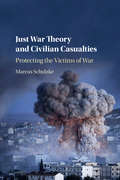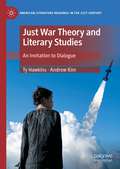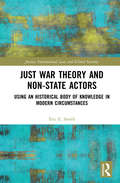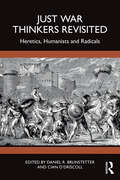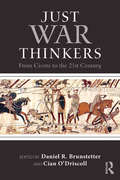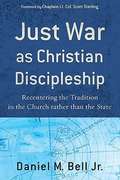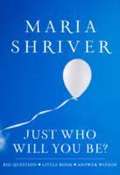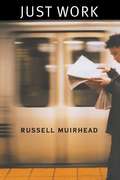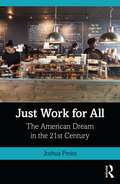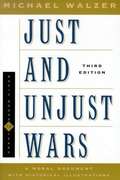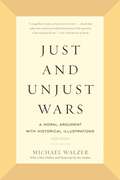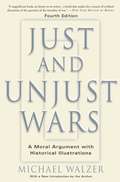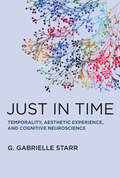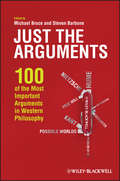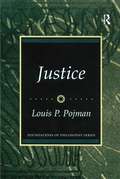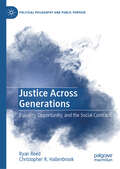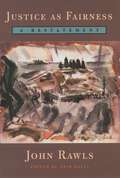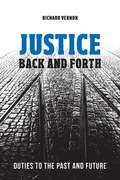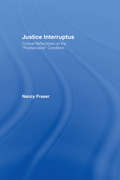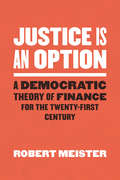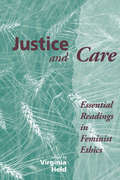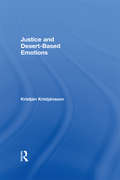- Table View
- List View
Just War Theory and Civilian Casualties: Protecting the Victims of War
by Marcus SchulzkeThere are strong moral and legal pressures against harming civilians in times of conflict, yet neither just war theory nor international law is clear about what responsibilities belligerents have to correct harm once it has been inflicted. In this book, Marcus Schulzke argues that military powers have a duty to provide assistance to the civilians they attack during wars, and that this duty is entailed by civilians' right to life. Schulzke develops new just war principles requiring belligerents to provide medical treatment and financial compensation to civilian victims, and then shows how these principles can be implemented in governmental, military, and international practice. He calls for a more individual-focused conception of international law and post-war justice for victims - as opposed to current state- or group-based reconstruction and reparation programs - which will provide a framework for protecting civilian rights.
Just War Theory and Literary Studies: An Invitation to Dialogue (American Literature Readings in the 21st Century)
by Andrew Kim Ty HawkinsThis book questions when, why, and how it is just for a people to go to war, or to refrain from warring, in a post-9/11 world. To do so, it explores Just War Theory (JWT) in relationship to recent American accounts of the experience of war. The book analyses the jus ad bellum criteria of just war—right intention, legitimate authority, just cause, probability of success, and last resort—before exploring jus in bello, or the law that governs the way in which warfare is conducted. By combining just-war ethics and sustained explorations of major works of twentieth and twenty-first century American war writing, this study offers the first book-length reflection on how JWT and literary studies can inform one another fruitfully.
Just War Theory and Non-State Actors: Using an Historical Body of Knowledge in Modern Circumstances (Justice, International Law and Global Security)
by Eric E. SmithThis book uses an historical body of knowledge, Just War Theory, as the basis for analyzing modern conflicts involving Armed Non-State Actors who employ force against states. As the global community faces the challenges of globalization, terrorism, 24-hour international news coverage, super power collapse, weapons of mass destruction, and failed states, the author explores whether the historic bodies of knowledge governing decision makers during conflict remain relevant. Tracing the evolution of Just War Theory, he analyzes circumstances involving Armed Non-State Actor (ANSA) groups possessing powerful and destructive capabilities and a desire to use them, and pursues answers to the central research question: how does Just War Theory apply in modern scenarios involving ANSA groups who challenge the state and international institution’s monopoly on use of force? The study finds that Just War Theory still has the capacity to accommodate modern day statecraft and application in scenarios involving Armed Non-State Actors. This book will be of great interest to those researching and studying in the fields of political theory, security studies, international relations, war and conflict studies, and public ethics.
Just War Thinkers Revisited: Heretics, Humanists and Radicals (War, Conflict and Ethics)
by Daniel R. Brunstetter Cian O’DriscollThis book comprises essays that focus on a range of thinkers who challenge the boundaries of the just war tradition.The ethics of war scholarship has become a rigid and highly disciplined activity, closely associated with a very particular canon of thinkers. This volume moves beyond this by presenting thinkers not typically regarded as part of that canon but who have interesting and potentially important things to say about the ethics of war. The book presents 20 profile essays on an eclectic cast of heretics, humanists, and radicals, from ancient Greece to the twenty-first century, who lived through and theorized about violence. The book asks how ethics of war scholars might benefit from engaging with them. Some of these thinkers engage directly with—to augment or criticize—the just war tradition, while others contribute to military thinking across the ages, pushing the boundaries of what was acceptable in war. Many proffer alternative moral frameworks regarding the legitimacy of political violence. The present volume thus invites scholars to reconsider the ethics of war in a way that challenges the standard delineation between just war theory, realism, and pacifism and to reflect on how those positions might inform our own approach to these matters.This book will be of much interest to students of just war theory, ethics of war, war studies, and International Relations.
Just War Thinkers: From Cicero to the 21st Century (War, Conflict and Ethics)
by Daniel R. Brunstetter Cian O’DriscollThis volume offers a set of concise and accessible introductions to the seminal figures in the historical development of the just war tradition. In what, if any, circumstances are political communities justified in going to war? And what limits should apply to the conduct of any such war? The just war tradition is a body of thought that helps us think through these very questions. Its core ideas have been subject to fierce debate for over 2,000 years. Yet they continue to play a prominent role in how political and military leaders address the challenges posed by the use of force in international society. Until now there has been no text that offers concise and accessible introductions to the key figures associated with the tradition. Stepping into this breach, Just War Thinkers provides a set of clear but detailed essays by leading experts on nineteen seminal thinkers, from Cicero to Jeff McMahan. This volume challenges the reader to think about how traditions are constituted—who is included and excluded, and how that is determined—and how they serve to enable, constrain, and indeed channel subsequent thought, debate, and exchange. This book will be of much interest to students of just war tradition and theory, ethics and war, philosophy, security studies and IR.
Just War and International Order
by Nicholas RenggerAt the opening of the twenty-first century, while obviously the world is still struggling with violence and conflict, many commentators argue that there are many reasons for supposing that restrictions on the use of force are growing. The establishment of the International Criminal Court, the growing sophistication of international humanitarian law and the 'rebirth' of the just war tradition over the last fifty years are all taken as signs of this trend. This book argues that, on the contrary, the just war tradition, allied to a historically powerful and increasingly dominant conception of politics in general, is complicit with an expansion of the grounds of supposedly legitimate force, rather than a restriction of it. In offering a critique of this trajectory, 'Just War and International Order' also seeks to illuminate a worrying trend for international order more generally and consider what, if any, alternative there might be to it.
Just War as Christian Discipleship: Recentering the Tradition in the Church rather than the State
by Daniel M. BellThis provocative and timely primer on the just war tradition connects just war to the concrete practices and challenges of the Christian life. Daniel Bell explains that the point is not simply to know the just war tradition but to live it even in the face of the tremendous difficulties associated with war. He shows how just war practice, if it is to be understood as a faithful form of Christian discipleship, must be rooted in and shaped by the fundamental convictions and confessions of the faith. The book includes a foreword by an Army chaplain, Scott Sterling, who has served in Iraq and study questions for group use.
Just Who Will You Be? Big Question, Little Book, Answer Within
by Maria Shriver"I've learned that asking ourselves not just what we want to be, but who we want to be is important at every stage of our lives, not just when we're starting out in the world. That's because in a way, we're starting out fresh in the world every single day." Just Who Will You Be? is a candid, heartfelt, and inspirational book for seekers of all ages. Inspired by a speech she gave, Maria Shriver's message is that what you do in your life isn't what matters. It's who you are. It's an important lesson that will appeal to anyone of any age looking for a life of meaning. In her own life, Shriver always walked straight down her own distinctive path, achieving her childhood goal of becoming "award-winning network newswoman Maria Shriver". But when her husband was elected California's Governor and she suddenly had to leave her job at NBC News, Maria was thrown for a loop. Right about then, her nephew asked her to speak at his high school graduation. She resisted, wondering how she could possibly give advice to kids, when she was feeling so lost herself. But in the end she relented and decided to dig down and dig deep, and the result is this little jewel. Just Who Will You Be? reminds us that the answer to many of life's question lie within -- and that we're all works in progress. That means it's never too late to become the person you want to be. Now the question for you is this: Just who will you be?.
Just Work
by Russell MuirheadThis elegant essay on the justice of work focuses on the fit between who we are and the kind of work we do. Russell Muirhead shows how the common hope for work that fulfills us involves more than personal interest; it also points to larger understandings of a just society. We are defined in part by the jobs we hold, and Muirhead has something important to say about the partial satisfactions of the working life, and the increasingly urgent need to balance the claims of work against those of family and community. Against the tendency to think of work exclusively in contractual terms, Muirhead focuses on the importance of work to our sense of a life well lived. Our notions of freedom and fairness are incomplete, he argues, without due consideration of how we fit the work we do. Muirhead weaves his argument out of sociological, economic, and philosophical analysis. He shows, among other things, how modern feminism's effort to reform domestic work and extend the promise of careers has contributed to more democratic understandings of what it means to have work that fits. His account of individual and social fit as twin standards of assessment is original and convincing--it points both to the unavoidable problem of distributing bad work in society and to the personal importance of finding fulfilling work. These themes are pursued through a wide-ranging discussion that engages thinkers from Plato to John Stuart Mill to Betty Friedan. Just Work shows what it would mean for work to make good on the high promise so often invested in it and suggests what we--both as a society and as individuals--might do when it falls short.
Just Work for All: The American Dream in the 21st Century
by Joshua PreissThis is a book about the American Dream: how to understand this central principle of American public philosophy, the ways in which it is threatened by a number of winner-take-all economic trends, and how to make it a reality for workers and their families in the 21st century. Integrating political philosophy and the history of political thought with recent work in economics, political science, and sociology, this book calls for renewed political and policy commitment to “just work.” Such a commitment is essential to combat the negative moral externalities of an economy where the fruits of growth are increasingly claimed by a relatively small portion of the population: slower growth, rising inequality, declining absolute mobility, dying communities, the erosion of social solidarity, lack of faith in political leaders and institutions, exploding debt, ethnic and nationalist backlash, widespread hopelessness, and the rapid rise in what economists Angus Deaton and Anne Case call deaths of despair. Covid-19 threatens to pour gasoline on these winner-take-all fires, further concentrating economic and political power in the hands of those best suited to withstand (and even profit from) the pandemic-driven economic crisis. In this book, the author provides a model for understanding the American Dream and making it a reality in a post-Covid-19 economy. A tour de force, this book is essential reading for scholars and researchers of political philosophy, political economy, political theory, and economics, as well as for the layperson trying to make sense of the post-pandemic world.
Just and Unjust Wars: A Moral Argument With Historical Illustrations, 3rd Ed.
by Michael WalzerThis classic work examines the issues surrounding military theory, war crimes, and the spoils of war from the Athenian attack on Melos to the My Lai massacre. A revised and updated classic treatment of the morality of war written by one of our country's leading philosophers. Just and Unjust Wars examines a variety of conflicts in order to understand exactly why, according to Walzer, "the argument about war and justice is still a political and moral necessity." Walzer's classic work draws on historical illustrations that range all the way from the Athenian attack on Melos to this morning's headlines, and uses the testimony of participants-decision makers and victims alike-to examine the moral issues of warfare.
Just and Unjust Wars: A Moral Argument with Historical Illustrations
by Michael WalzerFrom the Athenian attack on Melos to the My Lai Massacre, from the wars in the Balkans through the first war in Iraq, Michael Walzer examines the moral issues surrounding military theory, war crimes, and the spoils of war. He studies a variety of conflicts over the course of history, as well as the testimony of those who have been most directly involved--participants, decision makers, and victims. In his introduction to this new edition, Walzer specifically addresses the moral issues surrounding the war in and occupation of Iraq, reminding us once again that "the argument about war and justice is still a political and moral necessity."
Just and Unjust Wars: A Moral Argument with Historical Illustrations, 4th Ed.
by Michael WalzerFrom the Athenian attack on Melos to the My Lai Massacre, from the wars in the Balkans through the first war in Iraq, Michael Walzer examines the moral issues surrounding military theory, war crimes, and the spoils of war. He studies a variety of conflicts over the course of history, as well as the testimony of those who have been most directly involved--participants, decision makers, and victims. In his introduction to this new edition, Walzer specifically addresses the moral issues surrounding the war in and occupation of Iraq, reminding us once again that "the argument about war and justice is still a political and moral necessity. "
Just in Time: Temporality, Aesthetic Experience, and Cognitive Neuroscience
by G. Gabrielle StarrLiterature and neuroscience come together to illuminate the human experience of beauty, which unfolds in time.How does beauty exist in time? This is Gabrielle Starr&’s central concern in Just in Time as she explores the experience of beauty not as an abstraction, but as the result of psychological and neurological processes in which time is central. Starr shows that aesthetic experience has temporal scale. Starr, a literary scholar and pioneer in the field and method of neuroaesthetics, which seeks the neurological basis of aesthetic experience, applies this methodology to the study of beauty in literature, considering such authors as Rita Dove, Gerard Manley Hopkins, Henry James, Toni Morrison, and Wallace Stevens, as well as the artists Dawoud Bey and Jasper Johns.Just in Time is richly informed by the methods and findings of neuroscientists, whose instruments let them investigate encounters with art down to the millisecond, but Starr goes beyond the laboratory to explore engagements with art that unfold over durations experiments cannot accommodate. In neuroaesthetics, Starr shows us, the techniques of the empirical sciences and humanistic interpretation support and complement one another. To understand the temporal quality of aesthetic experience we need both cognitive and phenomenological approaches, and this book moves boldly toward their synthesis.
Just the Arguments: 100 of the Most Important Arguments in Western Philosophy
by Michael Bruce Steven BarboneDoes the existence of evil call into doubt the existence of God? Show me the argument. Philosophy starts with questions, but attempts at answers are just as important, and these answers require reasoned argument. Cutting through dense philosophical prose, 100 famous and influential arguments are presented in their essence, with premises, conclusions and logical form plainly identified. Key quotations provide a sense of style and approach. Just the Arguments is an invaluable one-stop argument shop. A concise, formally structured summation of 100 of the most important arguments in Western philosophy The first book of its kind to present the most important and influential philosophical arguments in a clear premise/conclusion format, the language that philosophers use and students are expected to know Offers succinct expositions of key philosophical arguments without bogging them down in commentary Translates difficult texts to core arguments Designed to provides a quick and compact reference to everything from Aquinas’ “Five Ways” to prove the existence of God, to the metaphysical possibilities of a zombie world
Justice
by Louis P. PojmanWritten by a group of distinguished philosophers, the Foundations of Philosophy Series aims to exhibit some of the main problems in the various fields of philosophy at the present stage of philosophical inquiry. This book is written from the viewpoint that although justice is the most important concept in political philosophy, it is also one of the most contested concepts in philosophy. Coverage begins with an overview of the concept of justice, arguing that justice is a vital part of political philosophy, which in turn is part of moral philosophy. The book outlines an objectivist view of moral philosophy, which holds that moral principles have universal validity. The material presents a philosophical map to navigate the plethora of confusing, competing theories and concepts regarding the importance of justice. The author distinguishes between formal and material concepts of justice and discusses the related issues of comparative/noncomparative justice and distributive versus commutative justice.
Justice Across Generations: Equality, Opportunity, and the Social Contract (Political Philosophy and Public Purpose)
by Ryan Reed Christopher R. HallenbrookThis book presents a contractualist theory of intergenerational justice that avoids deficiencies in existing IGJ theories, e.g., the non-identity problem and the under-defining of "generations." The inability of social contract theory to provide a thorough accounting of justice between generations has been called an embarrassment and rightly so. That said, serious attempts have been made from a variety of contract perspectives to rectify the approach&’s shortcomings in the area of intergenerational justice. One of the most prominent contract theorists, John Rawls, attempted to address justice between generations in his theory via his just savings principle, but both versions of it were met with stinging criticism. As the climate crisis, among other challenges, presses the issue of justice for future generations, the authors believe that intergenerational justice is something that social contract theory should and can address. Specifically, they present a Rawlsian approach that begins with a clarified understanding of what is meant by &“generations,&” and proceeds from there to modify generational knowledge constraints in the original position. The authors then draw upon the concept of indirect reciprocity to round out an argument for a Rawlsian principle of justice between generations: intergenerational fair equality of opportunity. They then apply their intergenerational justice theory to five major public policy areas.
Justice As Fairness: A Restatement
by John Rawls Erin KellyThis book originated as lectures for a course on political philosophy that Rawls taught regularly at Harvard in the 1980s. In time the lectures became a restatement of his theory of justice as fairness, revised in light of his more recent papers and his treatise Political Liberalism (1993). As Rawls writes in the preface, the restatement presents "in one place an account of justice as fairness as I now see it, drawing on all [my previous] works. " He offers a broad overview of his main lines of thought and also explores specific issues never before addressed in any of his writings. Rawls is well aware that since the publication of A Theory of Justice in 1971, American society has moved farther away from the idea of justice as fairness. Yet his ideas retain their power and relevance to debates in a pluralistic society about the meaning and theoretical viability of liberalism. This book demonstrates that moral clarity can be achieved even when a collective commitment to justice is uncertain.
Justice Back and Forth: Duties to the Past and Future
by Richard VernonIdeas of justice have traditionally focused on what individuals owe to one another and have drawn our attention to what is considered fair - what one of us owes to another is justly matched by what the other owes to them. However, what does justice require us to do for past and future generations?In Justice Back and Forth, award-winning author Richard Vernon explores the possibility of justice in cases where time makes reciprocity impossible. This "temporal justice" is examined in ten controversial cases including the duty to return historical artifacts, the ethics and politics of parenting, the punishment of historical offences, the right to procreate, and the imposition of constitutions on future citizens. By deftly weaving together discussions on historical redress and justice for future generations, Vernon reveals that these two opposing topics can in fact be used to illuminate each other. In doing so, he concludes that reciprocity can be adapted to serve intergenerational cases.
Justice Interruptus: Critical Reflections on the "Postsocialist" Condition
by Nancy FraserRefuting the argument to choose between "the politics of recognition" and the "politics of redistribution," Justice Interruptus integrates the best aspects of both. ********************************************************* ** What does it mean to think critically about politics at a time when inequality is increasing worldwide, when struggles for the recognition of difference are eclipsing struggles for social equality, and when we lack any credible vision of an alternative to the present order? Philosopher Nancy Fraser claims that the key is to overcome the false oppositions of "postsocialist" commonsense. Refuting the view that we must choose between "the politics of recognition" and the "politics of redistribution," Fraser argues for an integrative approach that encompasses the best aspects of both.
Justice Is an Option: A Democratic Theory of Finance for the Twenty-First Century (Chicago Studies in Practices of Meaning)
by Robert MeisterMore than ten years after the worst crisis since the Great Depression, the financial sector is thriving. But something is deeply wrong. Taxpayers bore the burden of bailing out “too big to fail” banks, but got nothing in return. Inequality has soared, and a populist backlash against elites has shaken the foundations of our political order. Meanwhile, financial capitalism seems more entrenched than ever. What is the left to do? Justice Is an Option uses those problems—and the framework of finance that created them—to reimagine historical justice. Robert Meister returns to the spirit of Marx to diagnose our current age of finance. Instead of closing our eyes to the political and economic realities of our era, we need to grapple with them head-on. Meister does just that, asking whether the very tools of finance that have created our vastly unequal world could instead be made to serve justice and equality. Meister here formulates nothing less than a democratic financial theory for the twenty-first century—one that is equally conversant in political philosophy, Marxism, and contemporary politics. Justice Is an Option is a radical, invigorating first page of a new—and sorely needed—leftist playbook.
Justice Is an Option: A Democratic Theory of Finance for the Twenty-First Century (Chicago Studies in Practices of Meaning)
by Robert MeisterMore than ten years after the worst crisis since the Great Depression, the financial sector is thriving. But something is deeply wrong. Taxpayers bore the burden of bailing out “too big to fail” banks, but got nothing in return. Inequality has soared, and a populist backlash against elites has shaken the foundations of our political order. Meanwhile, financial capitalism seems more entrenched than ever. What is the left to do? Justice Is an Option uses those problems—and the framework of finance that created them—to reimagine historical justice. Robert Meister returns to the spirit of Marx to diagnose our current age of finance. Instead of closing our eyes to the political and economic realities of our era, we need to grapple with them head-on. Meister does just that, asking whether the very tools of finance that have created our vastly unequal world could instead be made to serve justice and equality. Meister here formulates nothing less than a democratic financial theory for the twenty-first century—one that is equally conversant in political philosophy, Marxism, and contemporary politics. Justice Is an Option is a radical, invigorating first page of a new—and sorely needed—leftist playbook.
Justice Is an Option: A Democratic Theory of Finance for the Twenty-First Century (Chicago Studies in Practices of Meaning)
by Robert MeisterMore than ten years after the worst crisis since the Great Depression, the financial sector is thriving. But something is deeply wrong. Taxpayers bore the burden of bailing out “too big to fail” banks, but got nothing in return. Inequality has soared, and a populist backlash against elites has shaken the foundations of our political order. Meanwhile, financial capitalism seems more entrenched than ever. What is the left to do? Justice Is an Option uses those problems—and the framework of finance that created them—to reimagine historical justice. Robert Meister returns to the spirit of Marx to diagnose our current age of finance. Instead of closing our eyes to the political and economic realities of our era, we need to grapple with them head-on. Meister does just that, asking whether the very tools of finance that have created our vastly unequal world could instead be made to serve justice and equality. Meister here formulates nothing less than a democratic financial theory for the twenty-first century—one that is equally conversant in political philosophy, Marxism, and contemporary politics. Justice Is an Option is a radical, invigorating first page of a new—and sorely needed—leftist playbook.
Justice and Care: Essential Readings in Feminist Ethics
by Virginia Held<p>When feminist philosophers first turned their attention to traditional ethical theory, its almost exclusive emphasis upon justice, rights, abstract rationality, and individual autonomy came under special criticism. Women's experiences seemed to suggest the need for a focus on care, empathetic relations, and the interdependence of persons. <p>The most influential readings of what has become an extremely lively and fruitful debate are reproduced here along with important new contributions by Alison Jaggar and Sara Ruddick. As this volume testifies, there is no agreement on the important questions about the relationship between justice and care, but the debate has deepened and enriched our understanding in many ways.Justice and Care is a valuable collection of readings—an essential tool for anyone studying the state of feminist thought in particular or ethical theory in general.</p>
Justice and Desert-Based Emotions
by Kristján KristjánssonThe clear message proposed in this book is that justice matters for morality and desert matters for justice - and that emotions matter for desert, justice and morality. Moreover, and no less importantly, justice education needs to take all those facts into consideration. Kristján Kristjánsson’s new book falls on the cutting edge of the latest developments in justice discourse, both in philosophy and in the social sciences. Written from a philosophical perspective, it gives an accessible but penetrating exploration of various interlocking and interdisciplinary themes relating to justice. Kristjánsson justifies the necessary interplay between philosophers and social scientists dealing with justice, probes the role of desert in justice and explains the rising interest in the emotionality of justice. He then analyses the main desert-based emotions, connects his discussion to recent trends in developmental and social psychology, offers a moral justification of desert and desert-based emotions, and concludes by applying all those ideas in a close study of how justice and desert should be handled in moral education at school. Kristjánsson deftly weaves together insights from disparate academic areas relevant for justice, in general, and desert, in particular. This is an engaging, eye-opening and provocative book that should excite anyone interested in justice discourse and help generate debate in different areas related to justice: philosophical, psychological and educational.
